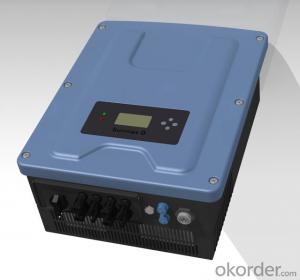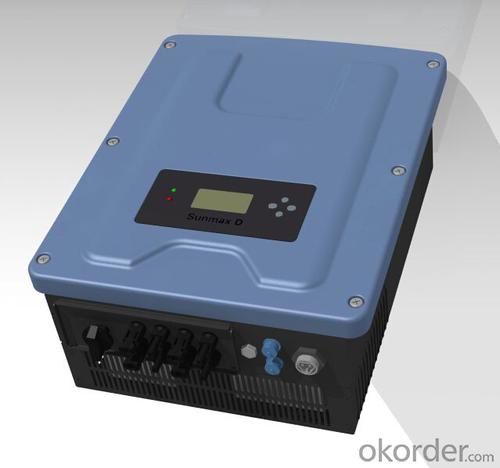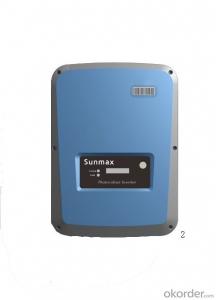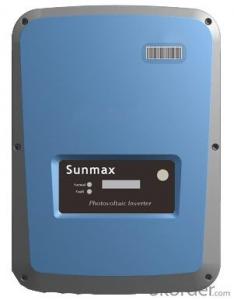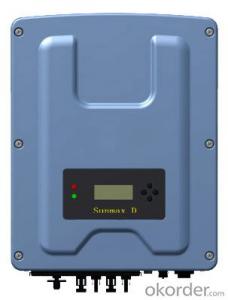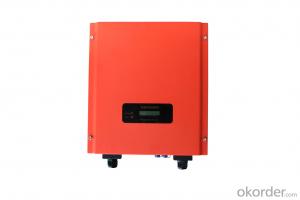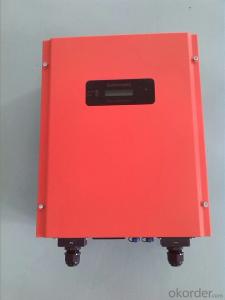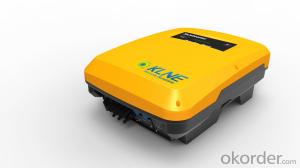Solar Inverter in Nigeria - PV Inverter Sunmax D 3000/4000/5000
- Loading Port:
- Shanghai
- Payment Terms:
- TT OR LC
- Min Order Qty:
- 5 watt
- Supply Capability:
- 3000 watt/month
OKorder Service Pledge
OKorder Financial Service
You Might Also Like
The Sunmax D 3000/4000/5000 series are applicable to rooftop installation and small scale photovoltaic grid-connected power plants. Their rated output powers are 3 kW, 4kW, 5 kW respectively. This series are transformer-less in design and have a wide range of MPPT voltage. Their maximum conversion efficiency and MPPT tracking accuracy reaches 97.6 % and 99.5 % respectively. The maximum DC voltage reaches 580 V. The series have dual MPPT trackers, providing maximum flexibility for solar plants. The series adopts the latest technology, supports reactive power adjustable and meets the VDE-AR-N 4105 standard.
Characteristics:
Dual MPPT with tracking efficiency over 99.9%
Supporting reactive power adjustable
Unit noise less than 30Db
Current harmonic less than 3%
Design features:
Allows access to third party monitoring system: Solar-log, Solar –man, Taoke, etc.
Equipped with active / inactive way to adjust the design instruction
Single / dual MPPT design
IP65 protection class to meet outdoor installation requirements
Transformer-less design
Units have built-in leakage current monitoring devices
Suspension design, installation is simple
Man-machine interface (LCD) in English, Italian, German languages
Man-machine interface (LCD) regulation parameters can be set making installation easy
Total digital design.
- Q: Can a solar inverter be upgraded or expanded?
- Yes, a solar inverter can be upgraded or expanded. Upgrades can involve installing additional features, improving efficiency, or increasing capacity. Expansion can involve connecting multiple inverters in parallel or series to accommodate larger solar installations. However, it is important to ensure compatibility and consult with a professional to ensure the upgrade or expansion is done correctly.
- Q: Can a solar inverter be used in areas with frequent power outages?
- Yes, a solar inverter can be used in areas with frequent power outages. Solar inverters have the ability to convert the direct current (DC) power generated by solar panels into alternating current (AC) power that can be used to operate electrical devices. During power outages, the solar inverter can continue to provide electricity from the solar panels, allowing for uninterrupted power supply. However, it is important to note that a battery storage system may be required to store excess solar energy for use during periods of low sunlight or at night when the solar panels are not producing electricity.
- Q: After the PV inverter, how to achieve the same period before the network?
- When the voltage, frequency, phase does not meet the requirements, the automatic closing closing pulse.
- Q: How does a solar inverter synchronize with the grid frequency?
- A solar inverter synchronizes with the grid frequency by constantly monitoring the frequency of the utility grid. It adjusts its own output frequency accordingly to match the grid frequency. This synchronization process ensures that the solar inverter's power output is in phase with the utility grid, allowing it to seamlessly inject solar energy into the grid without any disruptions or compatibility issues.
- Q: Can a solar inverter be used with solar-powered outdoor lighting?
- Yes, a solar inverter can be used with solar-powered outdoor lighting. A solar inverter is responsible for converting the DC (direct current) electricity produced by solar panels into AC (alternating current) electricity that can be used to power various devices, including outdoor lighting systems. This allows the solar-powered outdoor lighting to function efficiently and effectively.
- Q: Can a solar inverter be connected to a smartphone app for monitoring?
- Yes, a solar inverter can be connected to a smartphone app for monitoring. Many solar inverter manufacturers offer mobile apps that allow users to monitor and control their solar power systems remotely through their smartphones. These apps provide real-time data on energy production, system performance, and can also enable users to adjust settings and receive alerts or notifications related to their solar power system.
- Q: How does a solar inverter handle voltage transients?
- A solar inverter handles voltage transients by employing various protective mechanisms such as surge protection devices and voltage regulation techniques. These mechanisms help to stabilize and control the voltage level, ensuring that the inverter is not affected by sudden spikes or drops in voltage. Additionally, the inverter may include features like overvoltage and undervoltage protection, which help to prevent damage to the system during voltage transients.
- Q: Are there any ongoing maintenance requirements for a solar inverter?
- Yes, there are ongoing maintenance requirements for a solar inverter. Regular cleaning of the solar panels to remove dust and debris is necessary to maintain optimal performance. Additionally, inspections and tests of the inverter's components, such as cables and connections, should be conducted periodically to ensure everything is functioning properly. Monitoring the inverter's performance and addressing any issues promptly is also crucial for long-term maintenance.
- Q: How does the quality of the AC waveform affect the performance of a solar inverter?
- The quality of the AC waveform directly affects the performance of a solar inverter. A clean and stable waveform is essential for efficient and reliable operation of the inverter. Any deviations, distortions, or harmonics in the waveform can lead to increased power losses, reduced conversion efficiency, and potential damage to the inverter. Therefore, a high-quality AC waveform is crucial for optimal performance and maximum power output from a solar inverter.
- Q: How does a solar inverter communicate with other system components?
- A solar inverter communicates with other system components through various methods such as wired connections or wireless technologies like Wi-Fi or Bluetooth. It exchanges information with components like solar panels, batteries, and control systems to monitor and regulate the flow of electricity, optimize energy production, and ensure safe and efficient operation of the solar power system.
Send your message to us
Solar Inverter in Nigeria - PV Inverter Sunmax D 3000/4000/5000
- Loading Port:
- Shanghai
- Payment Terms:
- TT OR LC
- Min Order Qty:
- 5 watt
- Supply Capability:
- 3000 watt/month
OKorder Service Pledge
OKorder Financial Service
Similar products
Hot products
Hot Searches
Related keywords
